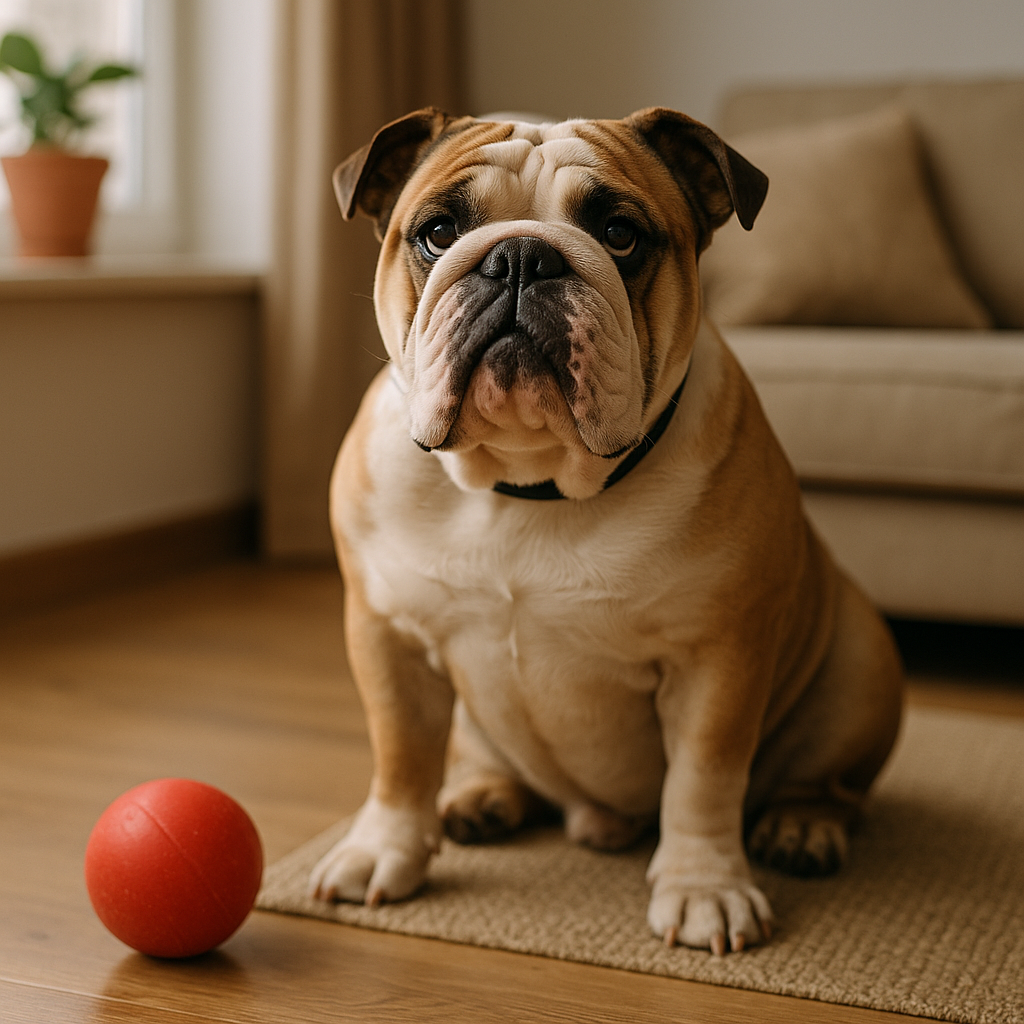The bulldog is a breed known for its sweet appearance, calm temperament, and unconditional loyalty. Although their average life expectancy is 8 to 10 years, with proper care, many bulldogs can live longer and enjoy an excellent quality of life. This article will teach you how to help your bulldog live longer and better through simple practices that can make a big difference.
Keep Your Bulldog at a Healthy Weight
One of the biggest factors affecting the health and longevity of bulldogs is excess weight. This breed naturally tends to accumulate fat due to a slower metabolism. Extra weight worsens respiratory, joint, and heart issues. To keep your bulldog in shape, it’s essential to control portion sizes, avoid giving table scraps, and choose high-quality kibble designed for brachycephalic breeds. Consult your vet regularly to adjust the diet based on age, activity level, and body condition. A bulldog at a healthy weight breathes better, moves more easily, and has a lower risk of developing chronic illnesses.
Provide Daily Exercise—But in Moderation
While bulldogs aren’t hyperactive, they do need regular physical activity to stay healthy. Exercise helps strengthen muscles, improve cardiovascular health, and prevent obesity. Ideal routines include gentle walks of 15 to 20 minutes, twice a day. You can also stimulate your bulldog with indoor fetch games or food puzzles. Avoid intense exercise, especially in hot weather, and always monitor their breathing. If they pant excessively or seem exhausted, stop the activity immediately. A bit of daily movement can significantly increase your bulldog’s lifespan.
Protect Your Bulldog from Heat and Humidity
Due to their short snout, bulldogs are very sensitive to high temperatures and have a limited ability to cool themselves. This makes them prone to heatstroke, which can be dangerous or even fatal. Never leave your bulldog in a car, not even for a few minutes. On hot days, keep their environment cool and well-ventilated, always provide cold water, and avoid going for walks during midday. Use cooling mats or fans if needed. The best walking times are early morning or late evening, when it’s cooler.
Care for Their Wrinkles and Skin
The iconic wrinkles of the bulldog can trap moisture, bacteria, and dirt if not cleaned properly. This buildup can cause infections, bad odor, and discomfort. To prevent this, clean the wrinkles on the face, neck, and base of the tail using damp gauze or unscented pet wipes. Dry the areas thoroughly to avoid fungal growth. Bathe your bulldog about once a month with a gentle shampoo for sensitive skin. Keeping their skin clean and dry is essential for overall health.
Regular Vet Visits Are Crucial
Prevention is key to a long and healthy life. Even if your bulldog appears fine, semi-annual vet visits are important. During checkups, early signs of issues like infections, allergies, breathing problems, or joint disorders can be detected. It’s also vital to keep up with vaccinations, internal and external parasite control, and annual bloodwork starting at six years of age. Early detection improves outcomes and can avoid costly treatments or emergencies.
Take Care of Their Dental Health
Dental hygiene is often overlooked but directly affects vital organs like the heart, kidneys, and liver. Bulldogs are prone to tartar buildup and gum disease if their teeth aren’t cared for. Brush their teeth at least twice a week using dog-safe toothpaste. You can also offer dental treats and chew toys that help clean their teeth. If you notice persistent bad breath, swollen gums, or chewing difficulty, schedule a dental checkup.
Stimulate Their Mind and Emotions
Mental and emotional health are just as important as physical care. Bulldogs need affection, attention, and to feel part of the family. They don’t cope well with prolonged solitude and can develop separation anxiety. Spend quality time with your bulldog daily through play, cuddling, or walks. Teach basic commands to keep their mind active and use interactive toys to prevent boredom. A mentally stimulated and emotionally balanced bulldog behaves better, stays active, and lives more joyfully.
Adapt Your Home to Their Needs
Your bulldog’s living space should be safe, clean, and comfortable. Make sure their bed is in a quiet area, away from drafts or cold floors. If they’re older or have joint issues, an orthopedic bed can help relieve discomfort. Use non-slip rugs if your home has slippery floors, and keep small or toxic items out of reach. Wash blankets, toys, and food bowls regularly. A hygienic and adapted environment improves quality of life and prevents illness.
Watch for Warning Signs
Dogs can’t speak, but their bodies and behavior can tell you when something’s wrong. Changes in appetite, excessive thirst, constant panting, lethargy, limping, vomiting, or diarrhea are signs that require immediate veterinary attention. Also, check their skin, eyes, ears, and folds for redness, discharge, or unpleasant odors. Being alert to these signs helps you act early and avoid complications.
Give Time, Love, and Patience
The most powerful ingredient for a long bulldog life is love. This breed thrives on companionship, affection, and feeling valued. Give them quality time, establish consistent routines, and respect their pace. It’s not just about meeting basic needs, but building a relationship based on mutual respect and emotional connection.
Caring for a bulldog isn’t hard, but it does require dedication. By applying these tips with consistency and love, you’ll be doing everything possible to help your bulldog live longer—and most importantly—live well, happy, and by your side.
